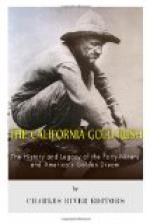CHAPTER VII
THE WAY BY PANAMA
Of the three roads to California that by Panama was the most obvious, the shortest, and therefore the most crowded. It was likewise the most expensive. To the casual eye this route was also the easiest. You got on a ship in New York, you disembarked for a very short land journey, you re-embarked on another ship, and landed at San Francisco. This route therefore attracted the more unstable elements of society. The journey by the plains took a certain grim determination and courage; that by Cape Horn, a slow and persistent patience.
The route by the Isthmus, on the other hand, allured the impatient, the reckless, and those who were unaccustomed to and undesirous of hardships. Most of the gamblers and speculators, for example, as well as the cheaper politicians, went by Panama.
In October, 1848, the first steamship of the Pacific Steamship Company began her voyage from New York to Panama and San Francisco, and reached her destination toward the end of February. On the Atlantic every old tub that could be made to float so far was pressed into service. Naturally there were many more vessels on the Atlantic side than on the Pacific side, and the greatest congestion took place at Panama. Every man was promised by the shipping agent a through passage, but the shipping agent was careful to remain in New York.
The overcrowded ships were picturesque though uncomfortable. They were crowded to the guards with as miscellaneous a lot of passengers as were ever got together. It must be remembered that they were mostly young men in the full vigor of youth and thoroughly imbued with the adventurous spirit. It must be remembered again, if the reader can think back so far in his own experience, that youth of that age loves to deck itself out both physically and mentally in the trappings of romance. Almost every man wore a red shirt, a slouch hat, a repeating pistol, and a bowie-knife; and most of them began at once to grow beards. They came from all parts of the country. The lank Maine Yankee elbowed the tall, sallow, black-haired Southerner. Social distinctions soon fell away and were forgotten. No one could tell by speech, manners, or dress whether a man’s former status was lawyer, physician, or roustabout. The days were spent in excited discussions of matters pertaining to the new country and the theory and practice of




